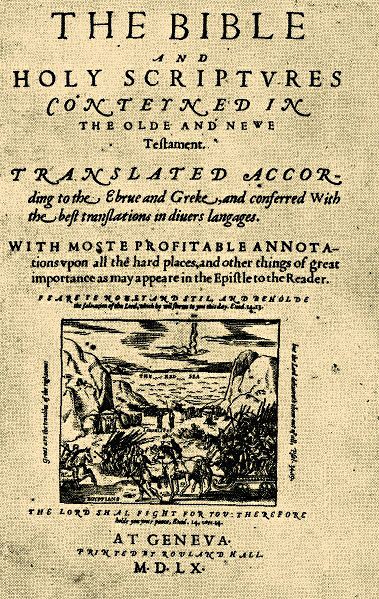|
|
|
Title Page of the Geneva Bible, 1560
 |
Financed by the English congregation in Geneva and dedicated to the new Protestant Queen, Elizabeth, the Geneva Bible was first printed in Geneva in 1560. Over the next eighty-four years it went through some 140 editions.
It was quickly nicknamed the "Breeches Bible" after its translation of Genesis 3:7: "Then the eyes of both [Adam and Eve] were opened, and they knew that they were naked, and they sowed fig tree leaves together, and made themselves breeches." All earlier translations had used the word "aprons" instead. The theology of its marginal notes is staunchly Calvinist; on Romans 11:15 the notes remark, "As the only will and purpose of God is the chief cause of election and reprobation: so His free mercy in Christ is an inferior cause of salvation, and the hardening of the heart an inferior cause of damnation." They are equally anti-Catholic; on Revelation 11:3, they read: "Locusts are false teachers, heretics, worldly, subtle prelates, with monks, friars, cardinals, patriarchs, archbishops, bishops, doctors, bachelors, and masters, which forsake Christ to maintain false doctrine." Throughout they insist that the Catholic sacrament of Confession has no authority in Holy Writ.
The marginal notes finally doomed the Geneva Bible, however, by embracing the Protestant theory of resisting tyranny. Notes like the one to Exodus 1:19, "When tyrants cannot prevail by craft, they burst forth into open rage," enraged King James, who thought they incited subjects to disobey. James ruled that the Geneva Bible was "seditious" and made its possession a felony. He commissioned an authorized version, the King James Bible, based on the Geneva version but stripped of its troublesome notes. But it took thirty years before James's Authorized Version fully replaced the beloved "Breeches Bible."
| |
|
|